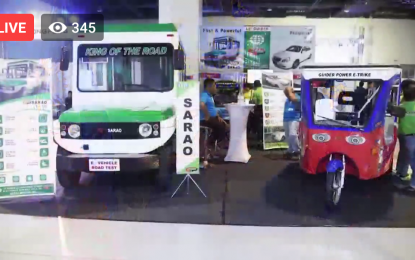
Prototypes of electric vehicles in the country. Screengrab from presentation of Trade Secretary Ramon Lopez at the 8th Philippine Electric Vehicle Summit on Sept. 24, 2020.
MANILA – The Philippines can be a regional hub for the manufacturing of electric vehicle (EV) components such as auto-electronics, charging stations, and battery, the country’s top official said Thursday.
Speaking at the 8th Philippine Electric Vehicle Summit held online Thursday, Department of Trade and Industry (DTI) Secretary Ramon Lopez said the country has three key advantages in the global EV industry.
These include the country’s strong electronics and electronic parts sector, mineral resources, and development of its competency in EV technology, he said.
“More than just locally manufacturing e-PUVs (public utility vehicles), let us envision the Philippines to be a globally competitive and innovative manufacturing hub for strategic EV parts and components like auto-electronics, charging stations, and EV batteries,” he added.
The DTI chief said EV industry can leverage on the domestic electronics manufacturing strengths and developing auto-electronics and EV components.
The industry shares more than 50 percent of Philippine exports.
Lopez added the Philippines is rich in mineral resources, such as nickel and cobalt that are used for producing batteries.
“In fact, the Philippines hosts 5 percent of global nickel reserves and 4 percent of global cobalt reserves. Let us make use of these valuable reserves to produce high value products such as batteries,” he said.
He said the Philippine Nickel Industry Association (PNIA) has partnered with the Power Battery Application Committee of China Industrial Association of Power Sources (CIAPS-PBA) to deepen the Philippine nickel industry’s participation in the global supply chain for battery production.
He added local EV manufacturer Tojo Motors has partnered with the CIAPS-PBA for the sourcing of battery cells and with Jiangsu Highstar Battery Manufacturing Company for the local assembly of EV batteries.
Lopez further said the country can develop its competency in EV technology like what it did for the aerospace industry by developing higher value design engineering for aerospace parts.
“On our end, the government is committed in its support to enable the Philippine EV industry, especially in helping manufacturers and promoting demand,” he said.
He cited fiscal and non-fiscal incentives being offered to EV industry investors through the Board of Investments (BOI) as the sector is part of the Investments Priorities Plan.
“We also have the Motor Vehicle Development Program (MVDP) and Executive Order 488. Likewise, the EV industry will benefit from the government’s PUV Modernization Program and DTI-BOI’s e-Mobility Initiatives,” Lopez added.
EV industry is also part of the priority sector under DTI’s Inclusive Innovation Industrial Strategy promoting the adoption of the Fourth Industrial Revolution.
The DTI chief also envisions the country to tap the global EV market.
Citing data from the International Energy Agency, global sales of electric cars in 2019 increased by 40 percent even the overall car market declined by 15 percent.
“That’s an additional 2.1 million EVs for a total of 7.2 million in the world today. This is the future and their transformation has started. We should not be left behind,” Lopez said.
He added the local EV industry is growing as major automobile brands, such as Mitsubishi and Nissan bring in their EV models in the Philippine market.
Korean carmaker Hyundai has already introduced its EVs in the Philippines.
Lopez said there are around 50 industry players, including EV manufacturers such as Bemac, Tojo Motors, and Star.
These local EV players annually produce 150,000 units of wide range EV products with combined project costs of PHP1.31 billion, he noted. (PNA)
 The Philippine News Agency is a web-based newswire service of the Philippine government under the supervision of the News and Information Bureau (NIB) of the Presidential Communications Office (PCO).
The Philippine News Agency is a web-based newswire service of the Philippine government under the supervision of the News and Information Bureau (NIB) of the Presidential Communications Office (PCO).